We are back at our normal venue from 3rd Sept. 2021 |
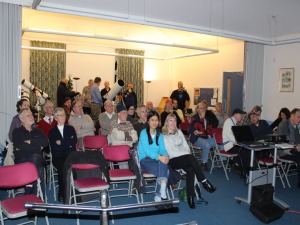
This page lists our monthly meetings. For other events open to the general public, see our Events page
Dates are set well in advance but the 'content' of the meeting is only updated (from our 'meetings database') when details are entered, so 'blank' or 'TBA' may be shown when data has not yet been entered (please be assured that the meeting will take place and a talk on (some) Subject will be delivered by (some) Speaker ! )
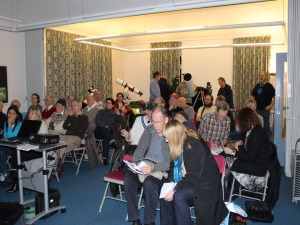
During the COVID-19 restrictions, all meetings are being held on-line using ZOOM. Meetings are normally held at the Church Hall (aka 'The Soltau Center') of St James-the-Less, Stubbings, Maidenhead SL6 6QW, from 7.30 (for a ZOOM link, or map and directions, see the About MAS (Where we meet) page
The Main Topic is usually delivered by an invited guest speaker. We aim to provide a diverse range of subjects linked (in some way) to Astronomy - whilst the 'Second Session' is typically delivered by one of our members. If time allows, the evening concludes with a short 'What to see this month'.
Details of a typical evening (times are approximate) :- 7.30pm. The evening starts with the Chairman delivering any important Announcements and then introducing the main speaker. 7.45pm (latest). Main Topic Speaker gets up and the lights are turned off. If you arrive after 7.45, please enter the Hall by the first door (on the right, after the entrance) and please be extra careful when finding a seat at the back of the Hall as members often setup telescopes there ! 8.45-9pm +. Coffee break during which visitors often chat with members who have set-up their telescopes at the back of the hall. If the weather is good, sometimes members will nip out for a quick look at the sky. Smoking is permitted outside the Hall, however smokers are asked to avoid any 'observers' (smoke particles always seem to get into optical equipment, no matter how well 'sealed' it may be) 9.15pm (at the latest). The 'Second Session' then runs for about 45 mins, typically ending with "What's Up !" (what to look out for in the sky this month) 10pm. We aim to clear the hall by 10pm. Post meeting Observing. If the weather is good, the Observing Organiser then leads the way to our chosen observing site, or (if the weather looks even a slight bit 'iffy) members sneak off to the local Pub instead :-)
Next meeting :
(+) 7 Jun 2024 MAS 67th AGM - (Annual General Meeting)
Meetings Archive |
The meetings archive gives an 'overview' of the Society activities over the past 10 years (see also the Events page).
Members have access to the full 'History of MAS' (including AGM minutes going back to 1957) along with full names and photos
The MAS 'year' runs from September of one year to June of the following. The end of year AGM in June elects the Committee for the following year (there are no meetings in July and August - although often members will meet informally at the local pub - which gives the new Committee time to 'get a grip' on running the Society)
The "short cuts" (in the 'title bar', at the very top of this page) will take you to the June AGM entry for the end of that MAS year
The Maidenhead Astronomical Society meetings archive (last 10 years only)
Missed a meeting, or can't remember when a topic was last covered ? Here is the archive of past MAS meetings.
Note that this list covers only our monthly meetings and AGM's. Reports on Observing and Other Events are separate pages
If notes were taken at the meeting, the date below is underlined and shown with a '(+)' = click to see the notes (if no '(+)' is shown, no notes were taken - or, more likely, the webmaster hasn't found them and posted them up yet :-) )
(+) 3 May 2024 The Exploration of Venus - (Jim House)
(+) 5 Apr 2024 The Visible Universe - (Doctor Max Whitby)
(+) 1 Mar 2024 Water in the Universe - (Prof Jonathan Tennyson)
(+) 2 Feb 2024 The Mechanics of Eclipses - (Sheridan Williams FRAS)
(+) 5 Jan 2024 Telescope Parade - (and the Parker Solar Probe by Arthur White)
(+) 1 Dec 2023 SPECIAL FEATURE Herschels Lunatick Friends - (Andrew Lound)
(+) 3 Nov 2023 Binary Pulsars Einsteins Perfect Laboratories - (Barry Kellett)
(+) 6 Oct 2023 Solar Space Weather SOHO - (Dr Eric Dunford)
(+) 1 Sep 2023 The Changing Climate of Mars - (Peter Read)
(+) 2 Jun 2023 MAS 66th AGM - (Annual General Meeting)
(+) 5 May 2023 Two talks by members - (LATE CHANGE)
(+) 31 Mar 2023 Overview of telescopes and mounts - (Dave Hayes)
(+) 3 Mar 2023 Study of our Galaxy in the Era of Gaia - (James Binney)
(+) 3 Feb 2023 The Galaxy without a dark side - (Barry Kellett)
(+) 6 Jan 2023 Telescope Parade and Workshop - (by members)
(+) 2 Dec 2022 Xmas Social Photo Comp and Quiz - (set by members)
(+) 4 Nov 2022 Exploration of Jupiter - (Dr Mike Legett)
(+) 7 Oct 2022 The Lunar 100 - (Dr Lilian Hobbs)
(+) 2 Sep 2022 InfraRed Astronomy - (Dr Eric Dunford)
(+) 10 Jun 2022 MAS 65th AGM - (NOTE 2nd Friday)
(+) 6 May 2022 Gravitational Waves - (Joshua Pooley)
(+) 1 Apr 2022 Saturn - (Michael Foulkes)
(+) 4 Mar 2022 Update on the Exploration of Mars - (Jim House)
(+) 4 Feb 2022 What Astronomy Tells Us About The Origins of Life On Earth ? - (James Hough)
(+) 7 Jan 2022 Telescope Parade and Workshop - (by Members)
(+) 3 Dec 2021 Christmas Quiz set by members - (followed by Social Evening)
(+) 5 Nov 2021 CANCELLED - (Hall closed)
(+) 1 Oct 2021 Dark Nebulae - (Owen Brazell)
(+) 3 Sep 2021 How we reached the Moon - (Jerry Stone)
(+) 4 Jun 2021 63rd AGM (ZOOM on line meeting)
(+) 7 May 2021 Milestones in Astronomy - (Rod Hine (ZOOM on line meeting))
(+) 2 Apr 2021 The Red Sun - (Lyn Smith (ZOOM on line meeting))
(+) 5 Mar 2021 Tour of the Universe - (Jane Green (ZOOM on line meeting))
(+) 5 Feb 2021 Space Vehicles - (Graham Bryant (ZOOM on line meeting))
(+) 8 Jan 2021 The Astronomer's Toolkit - (Dr Lee Anne Willson (ZOOM on line meeting))
(+) 4 Dec 2020 Xmas Quiz - (set by members (ZOOM on line meeting))
(+) 6 Nov 2020 The Monster in the Crab - (Gary Poyner (ZOOM on line meeting))
(+) 2 Oct 2020 Is there anyone out there ? - (Bob Mizon (ZOOM on line meeting))
(+) 4 Sep 2020 Two eyes are better than one - (Stephen Tonkin (ZOOM on line meeting))
(+) 5 Jun 2020 COVID19 Postponed MAS 62nd AGM
(+) 1 May 2020 COVID19 Postponed The Monster in the Crab - (Gary Poyner)
(+) 3 Apr 2020 COVID19 meeting CANCELLED
(+) 6 Mar 2020 Recent Developments in Gravity Wave Research - (Martin Dyer)
(+) 7 Feb 2020 Ask an expert Q and A panel - (By Members)
(+) 3 Jan 2020 Equipment Parade - (By members)
(+) 6 Dec 2019 Xmas Quiz and social - (By members)
(+) 1 Nov 2019 The Origin of the Solar System - (James Fradgley)
(+) 4 Oct 2019 Kew Observatory and the origins of modern solar physics - (Dr Lee Macdonald)
(+) 6 Sep 2019 History of Mars Exploration - (Jim House)
(+) Aug 2019 Summer break - (no meeting)
(+) Jul 2019 Summer break - (no meeting)
(+) 7 Jun 2019 MAS 61st AGM - (and Photo Competition prizes)
(+) 3 May 2019 13 Journeys in Space and Time - (Colin Stuart)
(+) 5 Apr 2019 Space Weather - (Dr Colin Forsyth)
(+) 1 Mar 2019 The Extremely Large Telescope (ELT) - (Dr Aprajita Verma)
(+) 1 Feb 2019 Ask the Expert - (members panel)
(+) 4 Jan 2019 Equipment exhibition - (and EGM)
(+) 7 Dec 2018 Christmas Quiz and Social
(+) 2 Nov 2018 Short talks - (by members)
(+) 5 Oct 2018 The Future is out of this World - ( Dr Stuart Eves FRAS)
(+) 7 Sep 2018 13 Journeys through space and Time - (Postponed new date TBA)
(+) Aug 2018 Summer break - (no meeting)
(+) Jul 2018 Summer break - (no meeting)
(+) 1 Jun 2018 MAS 61st AGM - (and Photo Competition prizes)
(+) 4 May 2018 Using Video and an Aurora Encounter - (by members)
(+) 6 Apr 2018 Berkshire Astronomers - (Kenelm England FRAS)
(+) 16 Mar 2018 NEW DATE Jupiter and the Juno Mission - (Dr John Rogers)
(+) 2 Feb 2018 Talks by Members
(+) 5 Jan 2018 Telescope and Equipment workshop - (Q and A with members)
(+) 1 Dec 2017 Xmas Quiz and Social - (Quiz Master Tim H)
(+) 3 Nov 2017 Wonders of the Deep Sky - (Callum Potter)
(+) 6 Oct 2017 Observing the Sun - (by MAS members)
(+) 1 Sep 2017 Gravity Waves - (a recap by Martin Dyer)
(+) 2 Jun 2017 MAS 60th AGM - (and Photo Competition prizes)
(+) 5 May 2017 Novae - (Jim H)
(+) 7 Apr 2017 Comets - (Kenelm England)
(+) 3 Mar 2017 Pseudoastronomy - (Stephen Tonkin)
(+) 3 Feb 2017 Members short stories
(+) 6 Jan 2017 Telescope Parade - (exhibition by members)
(+) 9 Dec 2016 (note 2nd Friday) Christmas Quiz - (and members shorts)
(+) 4 Nov 2016 Observing Planetary Nebulae - (Owen Brazell)
(+) 7 Oct 2016 Astro tourism - (David Phillips)
(+) 2 Sep 2016 Rosetta Space Mission - (Andrew Morse)
(+) 3 Jun 2016 MAS 59th AGM - (and Photo competition results)
(+) 6 May 2016 Build a recording spectrometer John Paraskeva - (2nd half Spectrometer results Alun Halsey)
(+) 1 Apr 2016 The Universe in multiple wavelengths - (2nd half Gravity Waves)
(+) 4 Mar 2016 Astronomy and the Weather - (Robin Oldman)
(+) 5 Feb 2016 Sungrazing Comets - (Kenelm England FRAS)
(-) 8 Jan 2016 (note 8th as 1st is New Year) Practical Astrophotography - (and Telescope Parade)
8th Jan 2016 - Telescope Parade & Practical Imaging (weather permitting)
Report by SteveB
Photos Percy (all natural light)
As the meeting opened the clouds outside looked as if they would continue to break-up (we could already see stars) so Percy announced the 'imaging / observing session' would be held at our usual place.
We had a good turn-out with 7 members and one visitor bringing along telescopes. Tim was an exception - instead of his telescope he was showing some of his 'occultation' equipment - two or 3 of the timers he used (one a precision digital clock, built in the days before GPS) and his 'movie camera' (used to capture the actual occultation) which he set up connected to a PC acting as a display 'monitor'
Robin brought along the Society Lunt Solarscope on it's old EQ mount (with it's one working axis drive = lucky it's the RA that works :-) ). He also brought in his own Celestron GT (similar to EQ6) mount with an adapter plate mounting two 'short tube' refractors, one acting as a guide scope. His guide scope was fitted with an 'unnamed' copy of a Sky-Watcher SynGuider / NexGuide (ST-4) autoguider (which normally sells in the £200-250 region, power supply extra) = these guide cameras are designed to plug straight into the mounts ST4 guide 'port' (no additional computer needed).
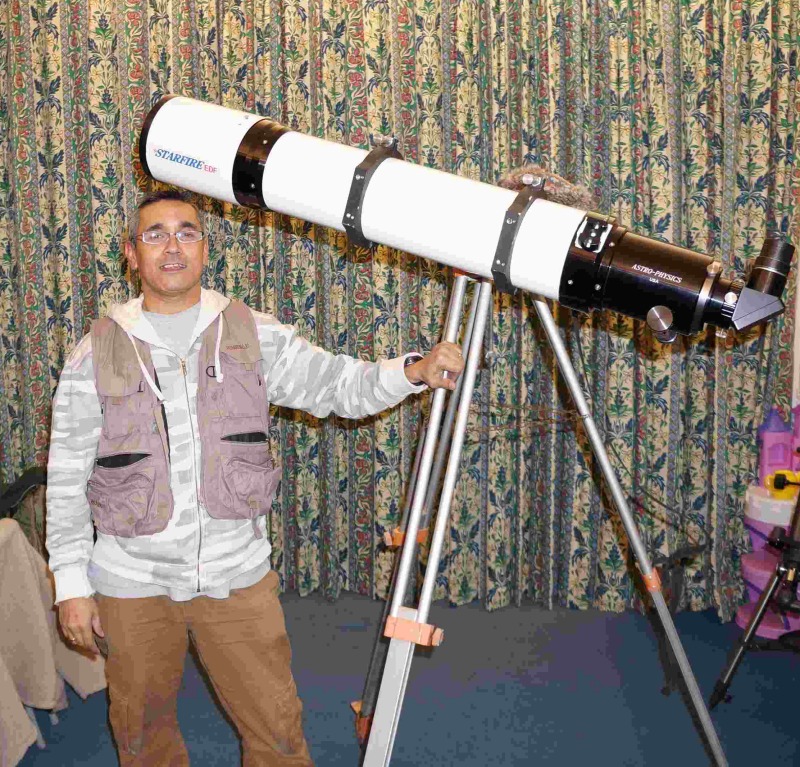
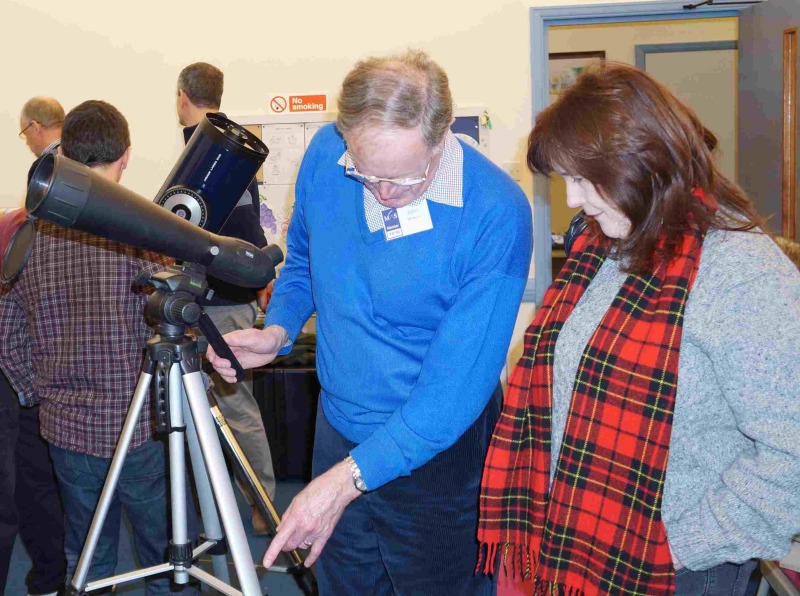
Percy had his usually impressive set-up of 'mega' manual tripod, which was mounting (this time) a 6" Starfire EDF refractor.
He also helped out one of our other members who brought along a very nice 90mm 'Spotter-scope' (with x30-90 zoom eyepiece), which I would expect to give excellent results (I typically use a 26mm eyepiece with a 1200mm focal length OTA giving 'only' x46 zoom)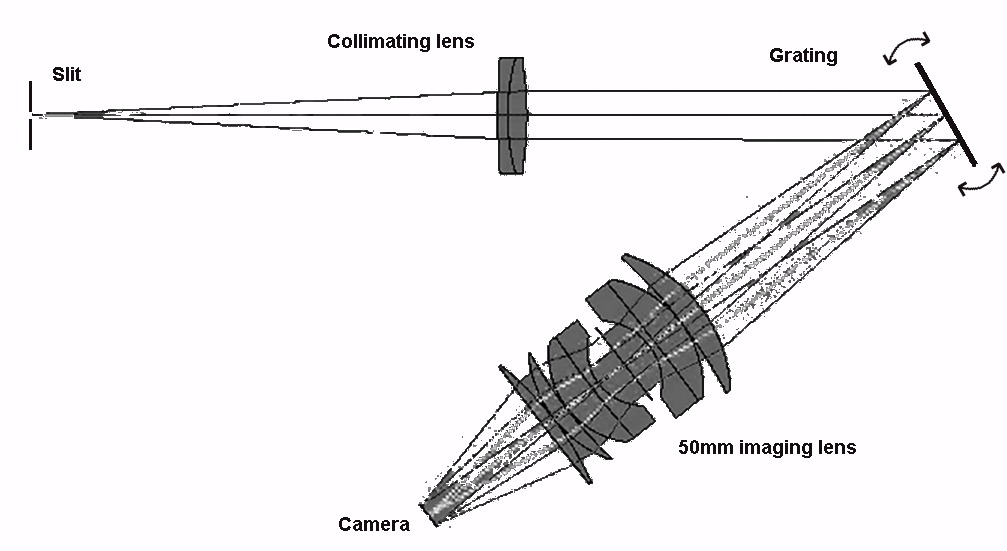
Alun H showed us his latest DIY build - a fully functioning Spectroscope ! Hopefully we can persuade him to deliver a 'how I did it' talk at some stage, however until then, see diagram right for some idea of how it works (Alun's version has a long arm to rotate the grating).
It's to be noted that the rather complex looking '50mm imaging lens' (right) is just a 'prime focus' lens taken off an old SLR film camera :-)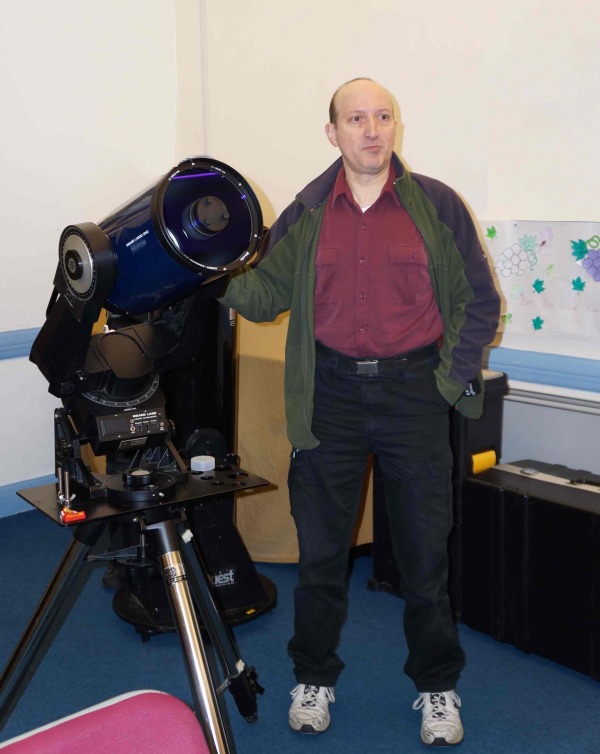
Dave H showed off his Meade SCT on it's Alt-Az fork mount, that had been adapted with an 'EQ wedge', but had to be manually operated (due to non-working electronics). The highlight of his presentation was an explanation of how to use the large 'setting circles' (which, of course, had been (correctly) orientated to RA/Dec by the 'wedge', although how Meade expected you to use them in Alt/Az orientation is beyond me). I've included some notes (at the end of this report) based on his explanation.
A visitor bought in a Celestron 70m on a manually guided EQ-1 style mount. Although a 'basic' instrument, it should perform well enough to show good detail on the Moon and maybe even 'spot' Jupiter (or at least it's 4 major moons), although 70mm might be a bit too small to show Saturn's rings in any detail ('ears', perhaps ?).I was showing off my Dobsonian, however I have not yet managed to image anything (other than the moon) with this - in theory it should be possible to image anything 'bright enough' to be captured in 'movie mode' (so the 4 planets = Venus, Mars, Jupiter & Saturn) or at moderate magnification for an exposure of a dozen seconds (before the lack of any guidance leads to star trails)
Second half
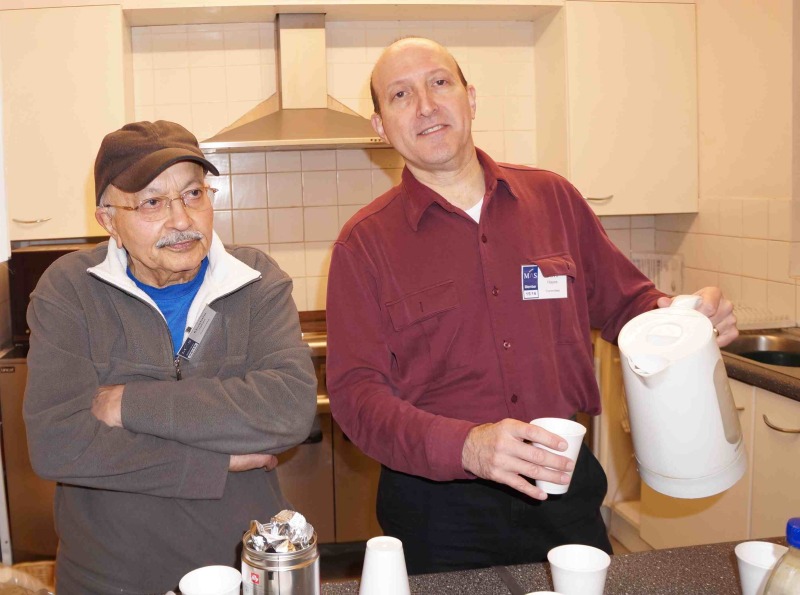

After Tea and Coffee, Robin delivered his 'What's Up' in the sky tonight along with the (very useful) 'tip' that to really see the colour of a star you just have to get it a bit 'out of focus' (something I for one have no problems doing :-) )Both Robin and Tim H pointed out the Occultation, on 19/20th Jan. of Aldebaran by the Moon (for more details, see the earthsky.org page) - however this is from 3-4am UK time (and to see the end, you need a high point with visibility down to the WSW horizon as the Moon is setting), so I expect only the truly dedicated 'occultation watcher' will be 'up for it' :-)
I found this Occultation prediction software on-line that should assist predicting future events
Robin also mentioned that the Planets will be seen in the early evening in a nice 'line up' (Jupiter, Mars, Saturn and Venus (which is always close to where the Sun set)) during January
As the evening ended, it became obvious that there would be no observing tonight as it was pouring with rain !
All our indoor Meetings are open to the public, however non-members are asked to make a contribution of £2 toward the hall hire costs (this may be collected by Fred, our Membership Secretary, at the door on arrival, or left at the 'Tea hatch' at half time).
Using Setting Circles
Ever wonder what those numbers are, arranged in a nice circle around your mounts RA and Dec axis ?
Essentially, they are the Latitude and Longitude of the sky which, before the days of 'goto', was the only way to find faint objects too dim to see easily (or at all)
Just as terrestrial Lat/Long 'stick to the Earth' (so London, for example, is always at 52 / 0 degrees, no matter where you are on earth), RA and Dec 'stick to the sky' (so Sirius, for example, is always at RA 06h 45m 08.917s / Declination -16° 42' 58.02")
Of course, just as you have to 'align your map' to North and work out 'where you are on Earth' before you can 'goto' London, you have to do the same for the sky (i.e. align you RA and Dec circles for 'where you are now' relative to the sky) before you can 'goto' Sirius ...
Aligning the Dec axis is easy, you just have to 'point it North' (actually, the Dec axis is fixed to the mount, and you point the mount North).
Declination is measured northward or southward from the celestial equator, however we don't have to care about that since as soon as we 'point North' the Dec grid is correctly 'aligned' (Polaris is at +89° 15' 50.8" i.e. the Dec grid will show about 90) and won't change.
A stars 'Dec' measurement is given in degrees. A 'negative' value such as -10 means 'count 90 away from the Pole and then go another 10'. So '-10' means 100 degrees 'away from' Polaris (so down the Dec grid form (+)90 to 0 then another 10 past 0 (i.e. toward the (-)90).
One thing to note is that the mount has to be exactly level (i.e. you will need to actually use the spirit level to adjust the mount legs to get the mount head flat) because (unlike a 'goto') there is no way to 'adjust' the RA/Dec to take into account a non-level mount :-)
The RA is the one thats going to cause you a headache == remember the stars 'stay in the same place', it's the Earth that moves, so aligning the RA means knowing 'exactly where you are now' and that means 'how far the Earth has turned' i.e. the exact time (and date). With that information you can more the RA grid until it's in the correct position 'now'. Hopefully this explains why a stars RA position is given in hours/minutes/seconds (i.e. as a time) and why your RA grid is marked from 0-24 Hrs :-)
Fortunately we can 'cheat'. Just as your 'goto' uses 2 or 3 bright stars to 'align' itself, you can use the same trick to align your RA grid. Unlike the 'clever' computer, however, there is no point in choosing 'different' stars (the computer does this to cope with non-level mount). Since your OTA is likely already 'pointed' at Polaris (so you can adjust the finder scope to point in the same direction as the main scope), and since Polaris is (always) at RA 02h 31m 49.09s, all you have to do is twist the RA grid until the OTA 'pointer' is aiming at 2h 32m and then lock the RA grid to the mount axis !
To check you have 'got it right', you could swing your OTA to (say) RA 6h 45m 08.917s and Dec -16° 43' and take a peek through the eyepiece (if you find Sirius, you are spot on !) So, no need to know the date/time (or remember if it's British Summer Time and, if so, does that add or subtract from the time now ..)
You can now dig out your favorite Star Atlas, read off the RA/Dec of the object you want to find, swing the OTA to that position and (if your mount is level) the object will be right in the center of your eyepiece !
The problem is that without a motorised RA axis, the RA 'grid' will drift out of alignment at a rate of 1 minute every minute. This need not be a problem if you noted the time when you first aligned the grid since, when you come to seek a new object, if (say) 30 minutes have passed since the last 'alignment adjustment', all you have to do is twist the RA grid by 30 minutes ... and it' will then be 'aligned (for now)' again (of course knowing 'which way' to twist the grid comes with 'experience', or, in my case, 'trial and error' :-) )
Actually, you can even cheat here, so long as you are still observing the first object. If that object is (say) the Andromeda Galaxy (M31), this is (always) at RA 00h 42m 44.3s. So, whilst it's still in view, just twist the RA grid to 0h 42m before leaving M31 for the new object (for maximum accuracy, do this just before moving the OTA = remember the 1 minute per minute drift) !
My final comment relates to the planets - unlike stars, they don't 'stick to the sky' i.e. planets 'wander'. This means the RA/Dec has to be 'worked out' (I suggest eg. using Stellarium) before the start of your observing session (finding Uranus or Neptune without knowing their RA/Dec 'tonight' is not as easy as you might hope :-) )
This note last modified: 11th Jun 2019 09:21.